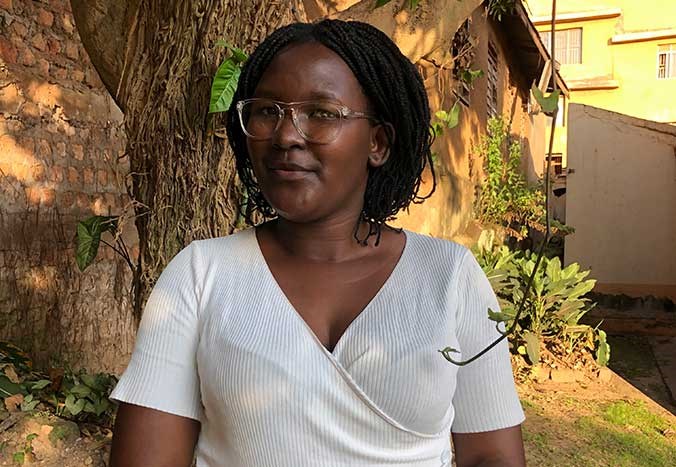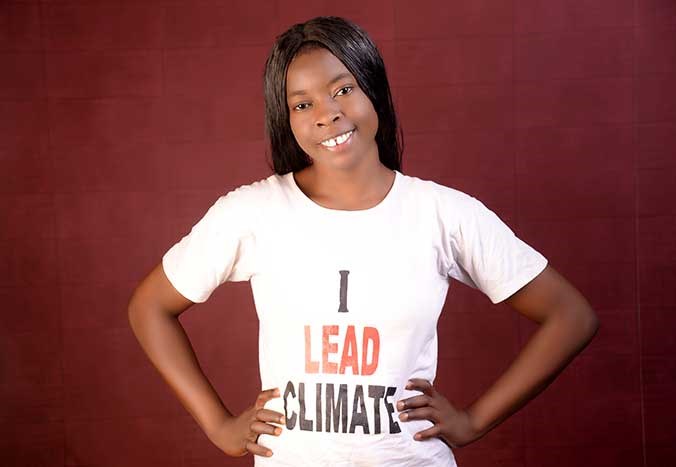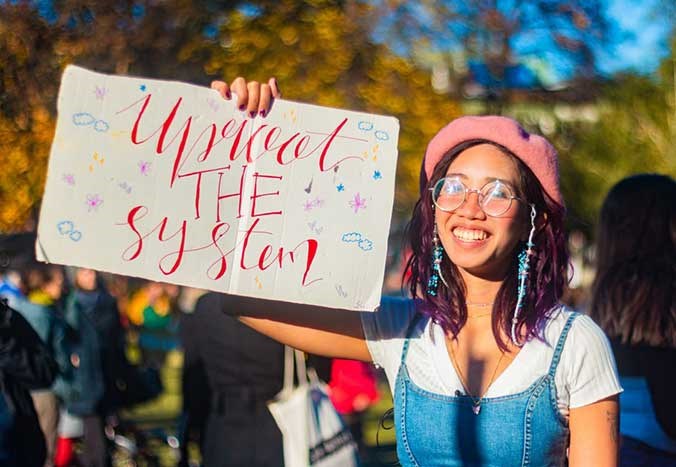First of the Month | July 2022
Over the past few months, we’ve been getting to know six climate activists who are fighting against climate and gender injustice in their communities and countries. Today, we’d like to introduce you to three of them.

Climate Justice x Gender Justice: 80% of those most affected by climate change are women, yet they are often excluded from the rooms where decisions are made.
Amos Trust Climate Fellowship
Meet Immaculate, Adenike and Mitzi
These three young women, whom we’ve met in person at the COP26 or virtually over the past few months, are passionate advocates for the rights of women and girls who are most affected by the climate crisis.
And they are vital actors in the fight against climate catastrophe, with essential expertise and perspectives which are too often overlooked. The role of the Amos Climate Fellowship is to ensure they receive more backing and encouragement (including from each other), and financial support so that the work they are doing can have the greatest impact.
They are part of our group of six activists who are now the first participants in our Fellowship, which we are running as a pilot this year. We are delighted to be working with them and look forward to shaping the Amos Climate Fellowship and the role it should play in future years with their input and guidance.
These three young women, whom we’ve met in person at the COP26 or virtually over the past few months, are passionate advocates for the rights of women and girls who are most affected by the climate crisis.
As well as monthly meetings to learn from each other and build community and solidarity, each participant receives a grant to develop a local project to advance climate and gender justice in their communities. We will share the learning from these projects and their stories of change — so you’ll be hearing more in the coming months from all six activists and the women and girls they are working alongside. So stay tuned!
Meet the activists
As we launch the Amos Climate Fellowship, you’ll have the opportunity to get to know all six participants and what they will be working on as Climate Fellows this year.
This month, we’re delighted to introduce you to three of them: Adenike, Immaculate, and Mitzi. Read on to hear about the impact of climate change in Uganda, Nigeria and the Philippines and what these three women will be doing as participants in the inaugural Amos Trust Climate Fellowship.
Meet Immaculate Akello — Uganda

Immaculate: “We cannot talk about climate justice without discussing women’s empowerment.”
Immaculate writes:
Farmers in the Otuke District of Northern Uganda face unprecedented impacts as our climate becomes more unpredictable. They have been hit by two consecutive droughts in 2021 and 2022. The district that once suffered the Karamojong cattle rustling conflict and the 20-year-long LRA war is still on its way to recovery and is now having to deal with a new war, climate change. Unfortunately, this war is fought with silent guns, ones that create an insurgency from which they can not run.
When the world is talking about achieving the Sustainable Development Goals, and the UN has just declared a Decade of Action, the people of Otuke do not relate to this “beautiful global agenda”.
Poverty levels are high, so they do not understand what the world means by “No Poverty”. Famine levels are skyrocketing, so “Zero Hunger” is a myth to them. Because of poverty, they cannot afford good health care or to eat a balanced diet, which means good health and well-being have become a thing of the past rather than the future. The education system is failing; the girls’ universities are in the kitchen while the boys have degrees in brick making and charcoal burning. Discussing quality education with them is a mockery.
Unfortunately, this war is fought with silent guns, ones that create an insurgency from which they can not run.
I do not want to discuss gender equality because violence in this community is driven more by livelihood challenges than the patriarchy. How can you show love to your wife when you can hardly provide money for a basic meal? I have witnessed marriages break down because of lack of food, as frustrated young men who have failed to sustain their marriages have turned to drink because alcohol seems to be the only cheap thing that offers them disguised comfort. For those young men trying to make ends meet, they have resorted to charcoal burning as a way to generate income.
Is something being done?
Yes, something is being done. Civil society (and the government, through the environment officers), are teaching the community about the effects of climate change and distributing tree seedlings to local groups. But this type of help doesn’t always have the intended impact on the ground.
Ironically, the community knows that deforestation is a bad practice, but they are faced with a difficult decision — “will we leave the tree to stand at the expense of our children’s well-being?” A bag of charcoal, when sold, can provide money for a few meals to keep them going and meet their children’s medical bills. These interventions are well-intentioned, but sometimes they aren’t being done right. We must involve the rural community in designing and implementing our projects, and ensure that they own the project, lest they see our community engagements and training as merely money-making ventures from which they can get allowances and facilitation.
I have witnessed marriages break down because of lack of food, as frustrated young men who have failed to sustain their marriages have turned to drink because alcohol seems to be the only cheap thing that offers them disguised comfort.
We have held meetings with community elders, cultural leaders and women to discuss climate change issues and how it affects the community. We discovered that there was low crop yield, leading to hunger and starvation. The community was desperately cutting down trees to meet their daily needs and planting rice in the wetlands, disrupting the ecosystem.
The community was able to come up with some solutions to these challenges. They shared traditional ways of irrigation, cultural practices of preserving trees, and the need for income-generating activities to combat climate change, which gave birth to our Shea Glo Green business venture.
This idea is a community-driven and community-led green business venture which works with 150 rural women to produce shea butter from the nuts of the shea tree. The women are employed in collecting the nuts and the drying and preservation process. The nuts are processed and sold to the market as butter, skin and hair products.
Ironically, the community knows that deforestation is a bad practice, but they are faced with a difficult decision — “will we leave the tree to stand at the expense of our children’s well-being?”
Through this process, we have managed to keep the shea nut tree standing because many of the community women have started to see the tree as a source of employment.
We are happy to see lives changing as we strive to combat climate change in the rural community of Otuke. Our hope is to use climate action to empower lives and achieve other sustainable development aims interlinked with climate action. We believe that the future is rural in the implementation of these goals.
You can follow Immaculate on Twitter at @immyivy
Visit Immaculate’s website at akellokwan.co
Meet Adenike Oladosu — Nigeria

Adenike: “The climate change crisis disproportionately affects Africa, and we need to act now.”
Adenike writes:
My name is Oladosu Adenike Titilope. I am an eco-feminist, eco-reporter and climate justice leader from Nigeria. I am 28 years old and specialise in peace, security and equality in Africa, especially in the Lake Chad region. I’m the founder of ILeadClimate Action Initiative, which advocates for the restoration of Lake Chad and a green democracy. I have showcased my climate action at international, national, regional and local forums and have been a Nigerian youth delegate at COP25 and COP26 in Spain and the UK, respectively.
We should all be climate justice activists, whether white or black, old or young, female or male. I had my university education in Benue, Nigeria, known as “the food basket of the nation”. There, we experienced the clashes between the farmers and herders that often led to a loss of lives and property. This, in turn, affects our food systems. These impacts of climate change are affecting our diversity. Climate change is already leading to armed conflict, and the loss of livelihoods is creating fertile land for violent armed groups to expand their boundaries.
We should all be climate justice activists, whether white or black, old or young, female or male.
Yet, we have little or no awareness about climate change. So when I completed my university education, I decided to champion the climate justice movement in Nigeria because I believe that young people like me should be part of the decision-making of our tomorrow. That is why we need to act now to beat the burden of the climate crisis.
I also believe that we cannot find solutions to a crisis if we don’t know that the problem exists in the first place. I became an eco-feminist because environmental instability affects women’s rights. The abduction of the school girls from Chibok Town in Borno State further propelled my eco-feminism because the more women’s rights become threatened, the more it becomes impossible to achieve climate justice.
Through my research, I found out about the shrinking Lake Chad, and since then, I have advocated for its restoration: it has shrunk by 90% and led to the displacement of over 40 million people. This lake borders Nigeria, Niger, Chad and Cameroon. If we don’t restore Lake Chad, it will be impossible to achieve sustainable development and stability in the region.
The abduction of the school girls from Chibok Town in Borno State further propelled my eco-feminism because the more women’s rights become threatened, the more it becomes impossible to achieve climate justice.
My Amos Trust Climate Fellowship project focuses on access to resources for women in communities, particularly fertiliser. We have done this before, and 150 to 200 women benefited. Another focus for me is telling stories of how the climate crisis affects people in the region (the Sahel, Lake Chad) because storytelling is so powerful. I already tell stories through write-ups on my website and interviews via my YouTube channel.
This project, Adopting A Landscape, seeks to achieve sustainable development, bridge the gap between resources and women’s ability to access them, strengthen women’s bargaining power, reduce child brides and strengthen girls’ education, food security and climate resilience. I believe that achieving just one of these goals will lead to achieving all these and more.
You can follow Adenike on Twitter and Instagram
YouTube: The Eco-Feminist Channel
Website: womenandcrisis.com
Meet Mitzi Jonelle Tan — Philippines

Mitzi: “To fight for climate justice is to fight against all injustices, for the liberation of all. To address the climate crisis, we need system change — and for that, we need collective action.”
Mitzi writes:
I am Mitzi Jonelle Tan, a climate justice activist with Youth Advocates for Climate Action Philippines. My home is one of the most vulnerable countries in the world to the climate crisis. I grew up seeing communities around me engulfed by floods whenever there was a typhoon. In the past twenty years, we’ve had the highest number of extreme weather events, and the three strongest storm landfalls ever recorded have happened in the Philippines.
This means that I grew up afraid of drowning in my bedroom; I had to do my homework by candlelight because strong winds would knock out the electricity supply. So this story is already a privileged one. But the climate crisis isn’t just about extreme weather events; it’s also about the socio-economic problems that amplify it and are amplified by it — such as class inequality, racial injustice, and gender injustice.
In 2013, after super-typhoon Haiyan, young girls and women were forced into prostitution because of the devastation that the typhoon left behind. Climate justice cannot be achieved as long as gender injustice and other socio-economic crises exist.
I grew up seeing communities around me engulfed by floods whenever there was a typhoon. In the past twenty years, we’ve had the highest number of extreme weather events, and the three strongest storm landfalls ever recorded have happened in the Philippines.
Despite growing up with all this, I didn’t realise that what I was seeing and experiencing was “climate change.” The way that climate change was taught in school was foreign, technical, western, alienating, and not empowering at all, so I didn’t become a climate justice activist until much later on, in 2017, when I was able to talk to a leader of the Lumad Indigenous people. He told me how they were being harassed, displaced, militarised, and killed — all for protecting their ancestral land, the forests, and our planet.
He put stories and experiences behind the statistic that the Philippines is one of the most dangerous places for environmental defenders and activists. Then, ever so simply, he shrugged and chuckled and said, “that’s why we have no choice but to fight back”. That was when my bubble of privilege burst — here I was, unsure if I should become an activist, and here was someone who knew that we had no choice but to do it because, despite the dangers, the consequences of not standing up for our planet and communities were worse. So I decided to join our environmental defenders’ struggle and always have that lens of justice in my activism.
As I actively sought to learn more about the planetary emergency we are facing, I realised that the climate crisis wasn’t just the big typhoons and floods that ate up entire communities. The droughts also made our small farmers’ lives more difficult, especially when they already face injustices and oppression from landlessness plaguing our country. The Philippines is an agricultural country, where the farming sector is the poorest sector of society, with landlords owning large areas of land, keeping actual farmers poor. They often do not have access to essential services such as water and proper irrigation.
As I actively sought to learn more about the planetary emergency we are facing, I realised that the climate crisis wasn’t just the big typhoons and floods that ate up entire communities.
My Amos Trust Climate Fellowship project revolves around this: making climate education and water accessible for Lupang Ramos. From my own experience of climate education, I realised that we needed climate education that was contextualised to our experiences and empowering — especially for mothers and young girls who are often the first responders in times of emergency.
This realisation deepened after spending time with a farming community in Lupang Ramos, Cavite. The farmers there have taken back the land from landlords and are continuously defending it from possible conversion into a golf course, commercial area, or other subdivision for the rich. This community of small farmers focuses on healing the earth with sustainable farming through their practice of agroecology. However, they don’t have water access, which significantly burdens mothers and young girls because they are the ones in charge of fetching water.
We have worked with the mothers of the community on climate education in the past, and they’ve expressed a desire to pass this knowledge on to their children on a deeper level, especially to young girls who will one day take on their roles. They told us how they want to learn more about the climate crisis, how it connects to their struggle for land justice, and how manually digging for water has made it challenging to have time and energy to continue learning deeper.
With the worsening droughts making manually digging for water more and more difficult, together with the community, we came up with the idea of setting up a mobile solar-powered pump irrigation system. Then to empower them with deeper climate knowledge, we will continue our current work with them on climate education and create climate modules. As leaders of the community, they will also be able to teach this to others in their community when they meet twice a month.
This community of small farmers focuses on healing the earth with sustainable farming through their practice of agroecology. However, they don’t have water access, which significantly burdens mothers and young girls because they are the ones in charge of fetching water.
Women and girls’ education is crucial if we want to achieve climate justice. However, to provide that education, we need to understand the other socio-economic barriers keeping them from accessing that education: in this case, the lack of water irrigation systems. Lupang Ramos is seen as a model community in sustainable farming. With this project, we can get support from other farming communities defending their land. Together, we will achieve land justice and climate justice.
You can follow Mitzi on Twitter and Instagram
Please visit the Amos Trust Climate Fellowship to learn more about all this year’s Fellows. You’ll get to hear more from the other three participants in the coming months. Meanwhile, to sit in on a longer conversation with another Amos Climate Fellow, Disha Ravi, you can listen to her episode on our new podcast, We Do Hope!
A Little More
Words Of Hope E-news
Sign up to receive our regular ‘Words Of Hope’ emails and keep up to date with all the latest Amos news and information, including details of our trips and events, news from our partners around the world and all of our campaigns.
Online reflection
Join us every Tuesday at 5pm for ‘Words Of Hope’ — our online reflection. Simply click here to join us a few minutes beforehand.






